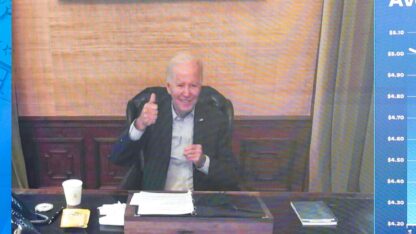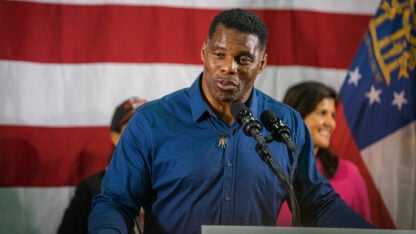President Biden reiterated his commitment to the elusive “two-state solution” — the long-sought vision in which an independent Palestinian state and Israel coexist — on Friday, as he spoke alongside Palestinian leader Mahmoud Abbas in Bethlehem in the occupied West Bank.
“The United States and my administration will not give up on trying to bring the Palestinians, Israelis and both sides closer together,” Biden said. He added that he believes that with Israel improving its relations with neighbors in the Middle East, that momentum could “reinvigorate the peace process between the Palestinian people and the Israelis.”
But for the time being, both Abbas and Biden acknowledged that the political moment is not yet right for peace talks to resume. In their joint statements, Abbas urged Biden to continue reversing Trump’s policies on aid and other issues, and Biden pledged to help improve the day-to-day lives of Palestinian people.
“I know that the goal of the two states seems so far away, while indignities like restrictions on movement and travel or the daily worry of your children’s safety are real, and they are immediate,” Biden said.
Biden noted that he reversed Trump’s decision to cut off Palestinian aid, saying the U.S. provided more than half a billion dollars in 2021. Biden said the U.S. will issue a grant of $100 million for Palestinian health care services and provide $200 million to the U.N. Relief and Works Agency for Palestine Refugees in the Near East (building on $400 million in 2021 aid).
In his own remarks, Abbas asked Biden to reopen the U.S. Consulate in East Jerusalem, remove the PLO from any U.S. terrorism lists, and to pave the way for the PLO to reopen its office in Washington — which was forced to close under Trump. Abbas also urged Biden to stop Israeli settlements and occupation.
After 74 years, Abbas said, “isn’t it not the time for this occupation to end and for our steadfast people again to gain their freedom and independence?”
Biden met Abbas after spending two days in Israel
Biden’s remarks came as he continued his first trip to the Middle East as president. He kicked off the trip with a two-day visit to Israel, where he signed a declaration with Israeli Prime Minister Yair Lapid saying Iran would never secure nuclear weapons.
His Friday visit to the occupied West Bank is an attempt to restore a relationship that was severely strained under former President Donald Trump.
Earlier Friday, Biden visited the Augusta Victoria Hospital in East Jerusalem, where he announced a U.S. investment of $100 million for a network of six hospitals.
The president will next visit Saudi Arabia
Biden will finish his Middle East tour with the most controversial leg: a visit to Saudi Arabia, where he’ll meet Saudi Crown Prince Mohammed bin Salman.
U.S. intelligence assessed that bin Salman approved the 2018 operation that resulted in the killing of journalist Jamal Khashoggi. Biden later said he would make Saudi Arabia “the pariah that they are,” and he’s been under pressure from human rights groups over his decision to visit the kingdom.
A day before his meeting with the crown prince, Biden stopped short of saying he would raise the issue of Khashoggi’s death directly, saying, “my views on Khashoggi have been made absolutely, positively clear.”
In advance of Biden’s visit, Saudi Arabia announced Friday it will allow civilian flights to cross its airspace from Israel, which allows airlines to shorten their flight times between Israel and countries such as India and China.
“As we mark this important moment, Saudi Arabia’s decision can help build momentum toward Israel’s further integration into the region, including with Saudi Arabia,” Biden said in a statement.
Copyright 2022 NPR. To see more, visit https://www.npr.org.
9(MDAxODM0MDY4MDEyMTY4NDA3MzI3YjkzMw004))
9(MDAxODM0MDY4MDEyMTY4NDA3MzI3YjkzMw004))








